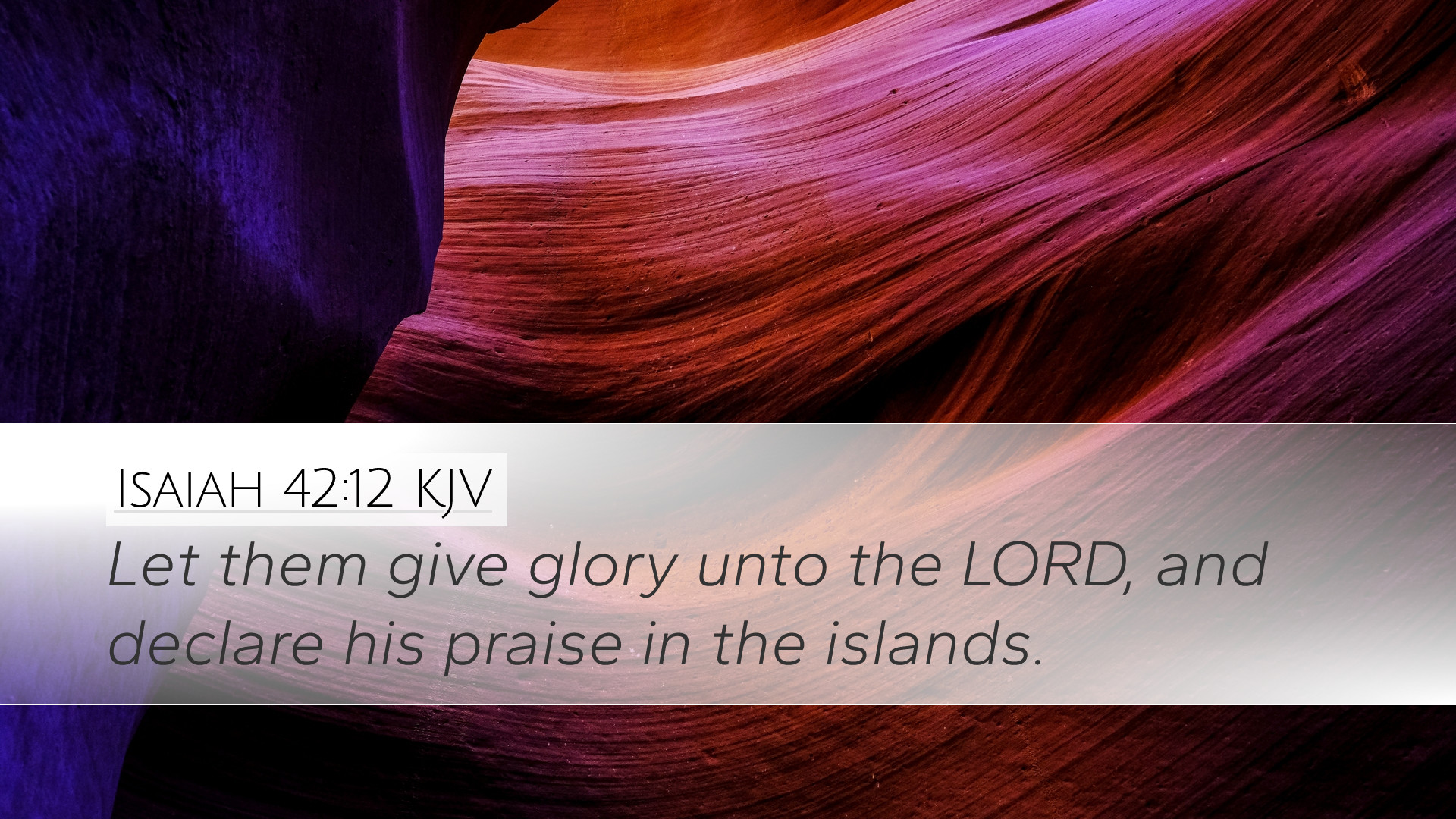Bible Commentary on Isaiah 42:12
Isaiah 42:12 states: "Let them give glory unto the Lord, and declare his praise in the islands." This verse captures an essential theme of praise and the proclaiming of God's glory, emphasizing the need for acknowledgment of His majesty by all nations, including those in remote places.
Contextual Background
In the broader context of Isaiah 42, the prophet speaks about the servant of the Lord who will bring justice to the nations. This section of Isaiah is significant as it lays the groundwork for understanding the ministry of God's chosen servant, which is often interpreted in light of Christ’s ministry. The exhortation for nations, represented here as "islands," to glorify God reflects the universal scope of His redemption.
Thematic Analysis
Both Matthew Henry and Albert Barnes provide insights into the thematic depth of this verse, connecting it to the overarching themes of God’s sovereignty and the call for humanity to worship Him.
-
Glory to God:
Henry emphasizes the importance of glorifying God as a response to His greatness. The imperative "let them give glory" is not only a command but a recognition of the glory that is due to God alone. All creation, even those from the most distant reaches, are called to sing His praises.
-
Universal Worship:
Barnes highlights the inclusivity of this call to worship, noting that it extends beyond Israel to all nations. This sets a precedent for the messianic mission that transcends cultural and geographical boundaries, emphasizing that worship is not limited to the chosen people but a gift to all humanity.
-
Proclamation of His Praise:
Adam Clarke delves into the implications of declaring His praise in the islands. He suggests that this indicates evangelistic efforts that extend to the farthest corners of the earth, signifying that God’s work is to be proclaimed universally. Such a declaration calls for both a heart of gratitude and a mission of declaration.
Exegesis of Key Terms
Understanding the terms within the verse can illuminate its meaning further:
-
"Give glory":
This phrase implies recognizing God’s sovereignty, power, and grandeur in every aspect of life. It is an act of worship that includes reverence and honor ascribed to God.
-
"Praise":
The act of declaring God’s attributes—His faithfulness, righteousness, and mercy. Clarke underscores that this praise involves an understanding of His character and deeds throughout history.
-
"Islands":
Symbolically, islands represent the nations that are often seen as remote or marginalized. Henry notes that this imagery suggests that no one is exempt from the call to worship God regardless of their physical or spiritual distance from Him.
Theological Implications
The verse raises significant theological implications for contemporary ministry:
-
Mission of the Church:
This verse asserts the church's mission to reach all nations with the gospel. It aligns with the Great Commission of Matthew 28:19-20, reinforcing that all people, from every "island," are called to respond to God in worship.
-
God’s Sovereignty:
It illustrates God's authority over all nations and peoples. The mandate for worship underscores the truth that God is the creator and sustainer of the earth, deserving of reverence from every corner of the globe.
-
Inclusiveness of Salvation:
The call to glorify God is an invitation to all, which reflects the inclusiveness of God’s redemptive plan. This verse anticipates a time when diverse peoples will gather to praise Him, reflecting the prophesied unity of believers from every tribe and nation.
Practical Application
Pastors, students, and theologians can draw practical applications from this verse:
-
Worship in Community:
Encourage local and global worship experiences that celebrate God's greatness, fostering a spirit of inclusivity and appreciation for God's handiwork in different cultures.
-
Evangelistic Initiatives:
Develop outreach programs that focus on reaching untapped places (“islands”) with the message of hope and salvation, underscoring the importance of spreading the gospel to the ends of the earth.
-
Personal Reflection:
Encourage individuals to reflect on their personal worship practices and consider how they proclaim God's glory in their lives. This reflection can be catalyzed through prayer, scripture, and community discussions.
Conclusion
Isaiah 42:12 serves as a potent reminder of our responsibility to glorify God and declare His praise across all nations. The insights from public domain commentaries like those of Matthew Henry, Albert Barnes, and Adam Clarke provide a comprehensive understanding of this verse's significance. The universal call for worship transcends cultural boundaries and challenges the church to fulfill its missional mandate in a diverse world.


